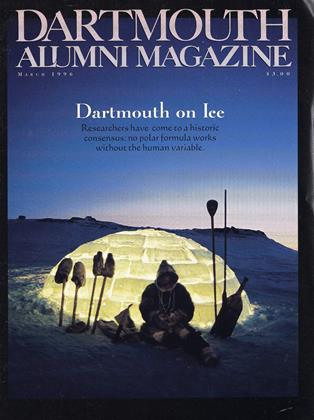This month's Presidential Range is adapted from President Freedman's speech at the College memorial service for Yitzhak Rabin held November 7, 1995.
With the death of Yitzhak Rabin, Israel has lost one of its most heroic leaders. He will forever be a member of that pantheon of heroes whose vision and courage have nourished the spirit of the Jewish people and the State of Israel.
Two years ago, in September 1993, Prime Minister Rabin told an audience on the West Lawn of the White House that violence among the neighboring nations of the Middle East must be brought to an end. "Enough is enough," he said. Just two weeks before his death, Prime Minister Rabin said, with eloquent passion, "We should not let the land flowing with milk and honey become a land flowing with blood and tears. Don't let it happen."
What was so remarkable about Yitzhak Rabin was his vision and courage. After adhering, for his entire life, to a policy of resistance to Arab and Palestinian hostility, Rabin came to recognize that the time was at hand to transcend the tragic consequences of war and to seek peace with Israel's enemies.
Although Rabin was a tough and brilliant soldier, although Rabin was the defense minister who responded to the intifada with the lightning application of powerful force, although Rabin was a sabra who traced his formation as an Israeli to the earliest, most besieged days of the nation, nevertheless he came to appreciate that a Zionist nation could not have territorial ambitions. He came to appreciate that reliance on force to keep down a subject population could only perpetuate an ethic of revenge and corrupt the spirit of Israel. He came to appreciate that Israel simply could not be an occupying power— could not rule another people against their will—and still retain its status as an idealistic and open society.
And so he determined that he must bring his country to a peaceful reconciliation with the Arab world, as painful to so many as that course would be in the short run. He knew that peace, like war, required courage and risk. He led Israel to accept the wisdom—indeed, the necessity—of such a reconciliation, and he opened the peace process that brought agreements with Egypt, Jordan, and the Palestine Liberation Organization. He was, as President Clinton wrote in the book of condolences at the Israeli Embassy, a soldier for freedom and a martyr for peace. ,
Many Americans have compared the assassination of Prime Minister Rabin to that of President Kennedy. It bears many similarities, especially in its devastating impact upon a democratic society and in its malign effort to extinguish a nation's hope for peace.
But it also bears comparison with the assassination of Abraham Lincoln. Like Lincoln, Rabin was seeking to heal a nation riven by ideological differences and torn byviolence. Like Lincoln, Rabin held civil authority in a nation still young, still forming its democratic character. And like Lincoln, Rabin may have been the only man with the moral stature and the political skill to seize the moment and achieve the peace that he and his nation sought.
What has been most heartening in the traumatic days following the assassination has been the stability of democracy in Israel. Despite the profundity of its loss, the nation carried forward its governance in an entirely constitutional manner, passing authority surely and steadily to the acting Prime Minister, Shimon Peres. The success of this transition is the mark of a mature democracy.
Our task now, as Americans, is to continue our staunch commitment to the State of Israel and its economic and political future. We must support Israel as it finds peace through its own democratic processes. And we must forever remember that it was Yitzhak Rabin whose shining brilliance—as a soldier and a peacemaker—lit the way.
Yitzhak Rabin knew there is a time to lead.
 View Full Issue
View Full Issue
More From This Issue
-
 Cover Story
Cover StoryCan Science Save the Arctic?
March 1996 By Lynn Noel '81 -
 Feature
FeatureDartmouth's Productivity
March 1996 By James Wright -
 Feature
FeatureThe Left Fielder's Glove
March 1996 By JOHN MONAHAN -
 Feature
FeatureBAKER'S DOZEN
March 1996 -
 Article
ArticleDr. Wheelock's Journal
March 1996 By "E. Wheelock" -
 Article
ArticleSpace Politics
March 1996 By Karen Endicott
James O. Freedman
-
 Article
ArticleTHE CONCEPT OF HEROISM
MAY 1991 By James O. Freedman -
 Article
ArticleThe Human Scale
September 1992 By James O. Freedman -
 Article
ArticleA Word to The Able
December 1992 By James O. Freedman -
 Article
ArticleEssayists and Solitude
November 1994 By James O. Freedman -
 Article
ArticleWhen Knowledge Cures
October 1995 By James O. Freedman -
 Feature
FeatureAn Honor, To a Degree
Sept/Oct 2002 By JAMES O. FREEDMAN
Article
-
 Article
ArticleCANOE CLUB PARTY COMPLETES TRIP AND RETURNS TO HANOVER
June 1921 -
 Article
ArticleTHE DARTMOUTH ALUMNI COUNCIL
December 1924 -
 Article
ArticleTHE GRADUATE MANAGER'S DREAM
OCTOBER 1931 -
 Article
ArticleAlumni Articles
June 1950 -
 Article
ArticleSeeing Red
Jul/Aug 2004 By Bonnie Barber -
 Article
ArticleFaculty
DECEMBER 1970 By WILLIAM R. MEYER

